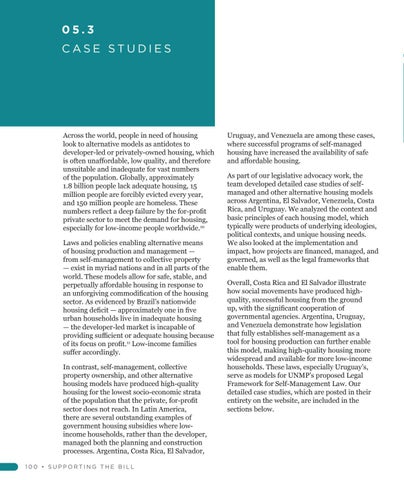05.3 CASE STUDIES
Across the world, people in need of housing look to alternative models as antidotes to developer-led or privately-owned housing, which is often unaffordable, low quality, and therefore unsuitable and inadequate for vast numbers of the population. Globally, approximately 1.8 billion people lack adequate housing, 15 million people are forcibly evicted every year, and 150 million people are homeless. These numbers reflect a deep failure by the for-profit private sector to meet the demand for housing, especially for low-income people worldwide.10 Laws and policies enabling alternative means of housing production and management — from self-management to collective property — exist in myriad nations and in all parts of the world. These models allow for safe, stable, and perpetually affordable housing in response to an unforgiving commodification of the housing sector. As evidenced by Brazil’s nationwide housing deficit — approximately one in five urban households live in inadequate housing — the developer-led market is incapable of providing sufficient or adequate housing because of its focus on profit.11 Low-income families suffer accordingly. In contrast, self-management, collective property ownership, and other alternative housing models have produced high-quality housing for the lowest socio-economic strata of the population that the private, for-profit sector does not reach. In Latin America, there are several outstanding examples of government housing subsidies where lowincome households, rather than the developer, managed both the planning and construction processes. Argentina, Costa Rica, El Salvador, 100 • SUPPORTING THE BILL
Uruguay, and Venezuela are among these cases, where successful programs of self-managed housing have increased the availability of safe and affordable housing. As part of our legislative advocacy work, the team developed detailed case studies of selfmanaged and other alternative housing models across Argentina, El Salvador, Venezuela, Costa Rica, and Uruguay. We analyzed the context and basic principles of each housing model, which typically were products of underlying ideologies, political contexts, and unique housing needs. We also looked at the implementation and impact, how projects are financed, managed, and governed, as well as the legal frameworks that enable them. Overall, Costa Rica and El Salvador illustrate how social movements have produced highquality, successful housing from the ground up, with the significant cooperation of governmental agencies. Argentina, Uruguay, and Venezuela demonstrate how legislation that fully establishes self-management as a tool for housing production can further enable this model, making high-quality housing more widespread and available for more low-income households. These laws, especially Uruguay’s, serve as models for UNMP’s proposed Legal Framework for Self-Management Law. Our detailed case studies, which are posted in their entirety on the website, are included in the sections below.













